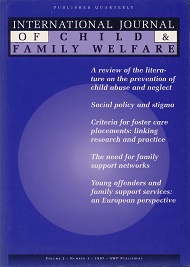Young offenders and family support services: an European perspective
Abstract
Because of specialization within the system of child welfare services in Western Europe, the treatment of young offenders and their families is increasingly being separated from the treatment of other troublesome young people. The author links this condition to three main developments in modern society, which also affect the organisation and distribution of family support services. The first of these developments is managerialism. The author highlights four key features leading to increased specialization of services: top-down planning, policy implementation, modern organizational structures and financial concerns. The second development is the increased emphasis on prevention in mainstream and project-based services. The third is that as mainstream child care services are increasingly being urged to encourage parental responsibility by providing non-controlling family support services, the same movement increasingly seeks to punish parental responsibility in the families of young offenders. These developments will increasingly lead to separate child welfare systems and a greater divergence in the treatment of children in need and children in trouble.

